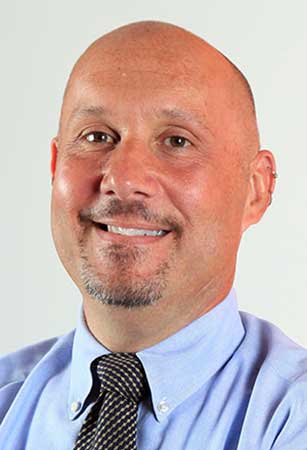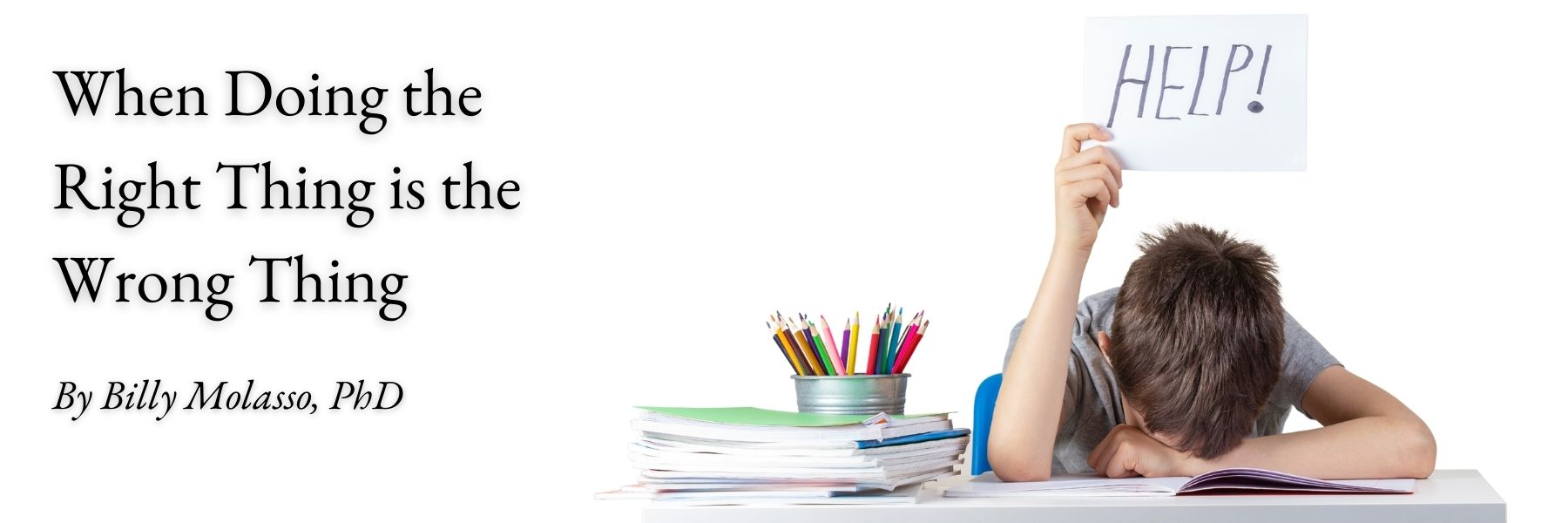BLOG
When Doing the Right Thing is the Wrong Thing
By Billy Molasso, PhD
It’s a curious thing that people often believe promises that can’t be true. Sometimes it’s due to laziness: they want the easy fix. Sometimes, it’s indifference: “I can’t do anything to change it anyway, so why worry?” Sometimes, as is the case with the latest wave of Science of Reading laws, it’s because hope is a powerful enough motivator that it trumps common sense.
These laws are vague, yet prescriptive; they hold a false promise of a silver bullet where none exists. Tragically, they may worsen the very problem they claim to solve.
The literacy pendulum has been swinging for decades, to the great dismay of veteran teachers.
We’ve been there, done that. We spent billions to achieve nothing with Reading First. We see in NAEP data that throughout history, no matter which was the prevailing theory of the day, the literacy rates largely stayed the same.
And yet people continue to hope that a new wave of SOR mandates will finally solve the “crisis,” despite history telling us otherwise, the knowledge that every child is different, decades of peer-reviewed research, and our own common sense. In Hanford’s latest podcast, she pats herself on the back for changing the trajectory of reading instruction in several states. “Outlawing cueing will fix the problem,” her acolytes state definitively, “because Science!” And they repeat it ad nauseam, without any evidence, precedent, or logic.
Spoiler alert: It won’t.
Whatever fad instruction is in place, at the end of the day, any good teacher knows that the highest law is, “Do right by the student in front of you.”
Fast forward to the day Teacher sits down with Student, and Student can’t grasp why bow doesn’t rhyme with bow, but it does rhyme with bough, which doesn’t rhyme with tough, and the rules they’ve been drilled in simply don’t apply. Should Teacher suggest – gasp – using context clues to figure it out, or should they follow laws that ban cueing?
Here we have a dilemma: does Teacher do what’s best for the child, or do what is required by law? In everyday, moment-to-moment teaching decisions, any teacher with integrity will choose to do right by the child — whether that be that may be phonics, or context clues, or guided reading, or group instruction, or one-to-one.
Even the National Reading Panel – frequently cited while justifying SOR laws – concluded that, “Phonics instruction should not become the dominant component in a reading program, neither in the amount of time devoted to it nor in the significance attached.” Yet here we are, forcing teachers to swim upstream amidst mandates that go against common sense tactics to help kids access the right tools at the right moment.
Let’s be clear: when you choose which tools teachers can use, you are choosing which children to help. Banning tools is tantamount to saying the children who need those tools don’t matter, and shame on the states that have legislated to leave some children behind. If you acknowledge that children deserve the right to read, your advocacy must reflect a commitment to ALL children.
As a one-to-one intervention that works with any classroom curriculum, Reading Recovery will always be needed to pick up the outliers that popular science leaves behind.
Luckily, that’s where Reading Recovery excels! The skillful Reading Recovery teacher knows that only about half of those literacy roadblocks can be solved by decoding – and they offer strategies, tactics, tools, and approaches for the other half as well. They observe the child’s strengths, build their confidence, and lend tailored support using not just phonics, but ALL the sciences of reading. Reading Recovery teachers close the gap day-by-day by keeping the child at the center of everything we do.
The unpopular truth about reading is that it’s complex. Every child learns differently. Every path is unique, with distinctive roadblocks that require the child to rely on the resources they built up. And no matter what the law says, no one classroom program yet exists that meets the needs of every student. For struggling readers, these roadblocks are particularly treacherous, and they need one-to-one intervention to help them navigate the path.
We reject the pipe dream that there’s an easy fix, and with the importance of childhood literacy, indifference would be a crime. But wise educators will never be content to rely on hope when they have the expertise to build a strategy. The best teachers will do right by all children and offer all the tools they need to succeed. How about you?
 All donations this month will go toward RRCNA’s advocacy efforts to keep Reading Recovery available to struggling readers.
All donations this month will go toward RRCNA’s advocacy efforts to keep Reading Recovery available to struggling readers.

Dr. Billy Molasso is the Executive Director of the Reading Recovery Council of North America.
Citations:
National Reading Panel National Reading Panel – Teaching Children to Read: An Evidence-Based Assessment of the Scientific Research Literature on Reading and Its Implications for Reading Instruction (nih.gov)
THE JOURNAL OF READING RECOVERY
Spring 2024
Constructing a More Complex Neural Network for Working on Written Language That Learns to Extend Itself by Carol A. Lyons
Reading Recovery IS the Science(s) of Reading and the Art of Teaching by Debra Semm Rich
Predictions of Progress: Charting, Adjusting, and Shaping Individual Lessons by Janice Van Dyke and Melissa Wilde
Teachers Designing for Context: Using Integrity Principles to Design Early Literacy Support in Aotearoa New Zealand by Rebecca Jesson, Judy Aitken, and Yu Liu




